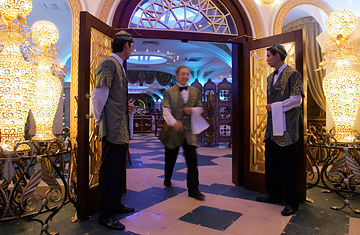
Waiters greet visitors at a traditional Kazakh restaurant in Almaty.
You'd think that a movie portraying their dynamic, increasingly prosperous Central Asian nation as a bunch of anti-Semitic, incestuous, pimping backwoods peasants would annoy the people of Kazakhstan. But try telling that to Dariga Nazarbayeva, daughter of President Nursultan Nazarbayev and one of Kazakhstan's leading cultural figures. Nazarbayeva — an accomplished mezzo-soprano who runs one of her country's TV networks — says that nothing before or since the tiny nation emerged from the ruins of the Soviet Union has given Kazakhstan anything like the recognition generated by Borat Sagdiev. That would be Borat, the comic alter ego of British actor Sasha Baron-Cohen, in his spoofy mockumentary Borat: Cultural Learnings of America for make Benefit Glorious Nation of Kazakhstan. Thanks to Borat, Nazarbayeva no longer has to explain where she's from: "I fly to the United States, Europe, anywhere, and give my passport to immigration," she says. "They all say: 'You are from Kazakhstan? Borat!' "
They might be hard-pressed to locate the country of 15 million on a world map, or to know that it sits atop about 100 billion barrels of oil and is one of the world's biggest producers of both wheat and uranium, but anyone in the West who pays even the most cursory attention to popular culture will almost certainly, thanks to Borat, have heard of Kazakhstan. Then again, the image of the country created by the movie couldn't be more appallingly crass. But it's all relative. Kazakhstan's neighbors include: Uzbekistan, which regularly makes news for its repressive crackdown on dissidents; Turkmenistan, which is best known for its former dictator's cult of personality so extreme that he renamed the days of the week after the women in his life; and Kyrgystan, which is where, exactly? Kazakhstan, by contrast, has the neighborhood bragging rights attached to being a big name in Hollywood.
Still, despite the fondness for Borat among the country's elite, the movie can't be found among the action movies and thrillers that dominate Kazakhstan's DVD stores. Kaharman Jazin, director of development for the Special Economic Zone in Astana, says he recently returned home from Croatia with numerous DVD copies for friends. Jazin says "the Borat factor" aids his efforts in coaxing foreign investors to plow billions into new development projects — "Thanks to Borat," he says, "the whole world knows about Kazakhstan." And Astana tour guide Gulmira Begimbetova reports seeing a notable spike in foreign vsitors since the movie's release. As Nazarbayeva puts it, Borat has been "good for business."
And the reason they don't take offense may be simple: They see Borat less as a reflection on themselves as it is a portrait of Americans, some of whom are shown in various unflattering situations, including threatening violence against Borat. "People in Kazakhstan are curious about Americans," says Jazin.
That curiosity is evident among the visitors to the Museum of the First President of the Republic of Kazakhstan in the new capital, Astana — a homage to Nazarbayev, who has ruled, unchallenged, for 17 years. The museum's biggest attraction for school outings and tourists alike are the gifts received by Nazarbayev from foreign leaders. And, says Leila Omarova, head of the museum's excursions department, "Everyone wants to know: What have the Americans given? "
The answer dismays almost all visitors — whose view of Americans, of course, also come from movies. In a room packed with such priceless gifts as the solid-gold replica of mosque doors from Saudi Arabia and a large gold gong from Malaysia, is a small glass cabinet containing Washington's gifts: four bowls — two silver, two porcelain — bearing the White House insignia, given at various times by Bill Clinton, George Bush, and Energy Secretary Samuel Bordman. Another display shows a box of 12 autographed golf balls given to Nazarbayev by Clinton in 1997.
What would Borat make of such modest gifts from the world's richest nation?
Omarova laughs. "Maybe there is an old American tradition that you give bowls to honored people?" she asks tentatively. Finding the answer might be considered a worthy mission for Ambassador Borat.
